Poll Of The Month: If you could prevent fiat currency from ever being invented/institutionalized, would you?
July, 2025's poll in the Mirrors For The Mind, Heart and Soul series
Money, we are told “makes the world go round”, but is that really true? Or does money rather, allow for, incentivize and push forward perpetual “sustained development”, “progress” and modern western civilization (statism)?
Our indigenous ancestors lived, learned, created and thrived before this thing called “money” existed, so perhaps the world would “go round” just fine without it, but what would that kind of life look like? And would you be willing to live in a world without money?
Before I present this month’s poll and open it up for casting your vote, lets take a look at some different perspectives on this thing called money for some context and to provide some food for thought.
“If you're lucky enough to have one of those pieces of paper that passes for money where you live, take it out. What do you see? Is it merely a colorful slip of dyed cotton? But how can this be? People are turned to crime and vice in pursuit of this?
Great loves are torn asunder for the lack of it? Wars are fought, murders committed, honorable men brought to disgrace in the names of these pieces of paper? Hmm. Imagine a Martian landing on our planet for the first time and observing the human species. He watches us scrambling from home to office to home day after day.
He sees us stealing from the store, scamming our neighbors, betraying our loved ones. All for what? These elusive pieces of paper? Hmm. It makes no sense to him. There must be more to the system than meets the eye, he speculates. The colored cotton these humans carry around in their wallets must be of great worth..
..There will come a time in your life, as it does in everyone's life, when you will be asked to compromise your ideals, your beliefs, the very core of who you are for a few of these colorful scraps of paper. So how about you?
What lengths are you willing to go to in your quest for that almighty dollar? If someone asks you to sell your soul for a matrix stake, are you, like Cypher, going to close your eyes and take a blissful bite?”
- James Corbett of
(from an essay titled “Selling Your Soul For A Matrix Steak” in his book “Reportage: Essays on the New World Order”Now re-wind about 400 years and take a look at a culturally contrasted temporal cross section from a time before the use of money was prevalent among the pre-colonial inhabitants of the Eastern Woodlands of Turtle Island (where I live now).
The following excerpt can help us glean illuminating insights via taking a look at how some of the indigenous inhabitants of the Eastern Woodlands viewed the European interlopers, their economic model and their society.
The following are excerpts from two books ( 1491 and The Dawn Of Everything ) which provide illuminating cultural and historical context that helps us to see the clear delineation between a community and culture operating on the Gift Economy, vs one operating on the fiat currency/scarcity economy.
In the most direct way, the generosity and liberty made indigenous villages into competitors for colonists’ allegiance. Colonial societies could not become too oppressive or stingy, because their members — surrounded by examples of well fed peoples living a free life — always had the option to vote with their feet. It is likely that the first British villages in North America, thousands of miles from the House of Lords, would have lost some of the brutally graded social hierarchy that characterized European life. But it is also clear that they were infused by the generous, democratic and informal brashness of Native American culture. That spirit of gift economics and liberty alarmed and discomfited many Europeans, toff and peasant alike. But it is also clear that many others found it a deeply attractive vision of human possibility.
Historian Cornelius J. Jaenen reported in an account to his American years, that the Huron, could not understand why:
'one Man should have more than another, and that the Rich should have more Respect than the Poor. ... They brand us for Slaves, and call us miserable Souls, whose Life is not worth having, alleging, That we degrade ourselves in subjecting our selves to one Man [a king] who possesses the whole Power, and is bound by no Law but his own Will.... [Individual Indians] value themselves above anything that you can imagine, and this is the reason they always give for’t, That one’s as much Master as another, and since Men are all made of the same Clay there should be no Distinction or Superiority among them.' [Emphasis in original.]
The essayist Montaigne had noted the same antiauthoritarian attitudes a century earlier. Indians who visited France, he wrote, “noticed among us some men gorged to the full with things of every sort while their other halves were beggars at their doors, emaciated with hunger and poverty. They found it strange that these poverty-stricken halves should suffer [that is, tolerate] such injustice”
The leaders of Jamestown tried to persuade Indians to transform themselves into Europeans. Embarrassingly, almost all of the traffic was the other way — scores of English joined the locals despite promises of dire punishment. The same thing happened in New England. Puritan leaders were horrified when some members of a rival English settlement began living with the Massachusett Indians.” (source)
When Europeans arrived to Turtle Island, they encountered very different societies than those they were accustomed to. Those societies had very different cultures, each with their own intellectual tradition.
The collision of two completely separate intellectual traditions led to the creation of an indigenous critique of European society, which Graeber and Wengrow call The Indigenous Critique.
The Indigenous Critique refers to critiques of European society which were developed by Turtle Islanders.”
In a book called “The Dawn Of Everything” Elizabeth Whitworth explains:
“In the late 1600s, European colonists in North America became engaged in philosophical discussions with the indigenous peoples of that land. Some of the indigenous people and the colonists learned to speak one another’s languages fluently. Graeber and Wengrow explain that the native North Americans had strong philosophical traditions and skilled orators who challenged European colonial officials in debates.”
In some cases, indigenous intellectuals travelled to Europe in order to study and understand feudal society. One such person was a Huron-Wendat leader named Kondiaronk, also known as Le Rat, who seems to have impressed everyone he ever met with his great brilliance.
Whitworth continues:
“In New France, Wendat leader Kandiaronk raised scathing critiques of European social customs and values, particularly criticizing monarchical rule, social hierarchies, emphasis on the accumulation of wealth and materialism, and punitive justice systems. These descriptions then made their way back to Europe, where they were widely distributed among the intellectual class and, Graeber and Wengrow argue, became the inspiration for much Enlightenment thought.
One of the major cultural differences the Europeans and indigenous people found they had was the notion of gift economics, equality and its connection to freedom. Indigenous ideas about sharing abundance with those in need, equality and freedom directly conflicted with the European notions of selfish materialism, social status and a natural hierarchy.
Beyond the emphasis of the indigenous critique on the immorality of the hierarchical and involuntary governance structures (Statism) that was prevalent in Europe (and being imported to Turtle Island with the settlers/colonial peoples) many of the people who called Turtle Island home were also very critical of the lack of compassion, generosity and charity which was ubiquitous in the European’s way of living.
After visiting France and then returning to the Eastern Woodlands of Turtle Island Kondiaronk (the Wendat chief described above) offers this distillation of the indigenous critique:
“I’ve spent six years thinking about the state of European society and I still can’t think of a single one of your ways that isn’t inhumane, and I sincerely believe that it can only be because you stick to your distinctions of ‘mine’ and ‘yours’.
I affirm that what you call money is the devil of devils; the tyrant of the French, the source of all evil; the scourge of souls and the slaughterhouse of the living. To imagine that one can live in the land of money and preserve one’s soul is like imagining that one can preserve one’s life at the bottom of a lake. Money is the father of luxury, lasciviousness, intrigue, deceit, lies, betrayal, insincerity, all the worst behaviors in the world. Fathers sell their children, husbands their wives, wives betray their husbands, brothers kill each other, friends are false, and all for money. In light of all this, tell me that we Wendat are not right to refuse to touch or even look at money?”
Kandiaronk continues, explaining human qualities valued by the Wendat by saying:
“Over and over I have set forth the qualities that we Wendat believe ought to define humanity – wisdom, reason, equity, etc. – and demonstrated that the existence of separate material interests knocks all these on the head. A man motivated by interest cannot be a man of reason. “
Kandiaronk’s view was that the greed, poverty, and crime found in French society arise from lust for money (an expression of their scarcity based economic model). By refusing to deal with money (and instead continuing to develop a reciprocal connection to nature’s gift economy), the Wendat were able to live in freedom and equality (with enough to share with those in need).
Kandiaronk:
“Do you seriously imagine, he says, that I would be happy to live like one of the inhabitants of Paris, to take two hours every morning just to put on my shirt and make-up, to bow and scrape before every obnoxious galoot I meet on the street who happened to have been born with an inheritance? Do you really imagine I could carry a purse full of coins and not immediately hand them over to people who are hungry; that I would carry a sword but not immediately draw it on the first band of thugs I see rounding up the destitute to press them into naval service?”
At that time, the region that came to be known as New France (now Ontario, Quebec and part of the US) was inhabited largely by speakers of Montagnais-Naskapi, Algonkian and Iroquoian (Potawatomi) languages. Those closer to the coast were often fishers, foresters and hunters, though most also practiced horticulture (and regenerative agro-forestry); the Wendat (Huron), concentrated in major river valleys further inland, growing maize, squash and beans around fortified towns.. with advanced regenerative agroforestry food production systems further beyond their three sisters fields.
..While French assessments of the character of (what they described as) ‘savages’ tended to be decidedly mixed, the indigenous assessment of French character was distinctly less so.
Father Pierre Biard, for example, was a former theology professor assigned in 1608 to evangelize the Algonkian-speaking Mi’kmaq in Nova Scotia, who had lived for some time next to a French fort.
Biard did not think much of the Mi’kmagq, but reported that the feeling was mutual:
“They consider themselves better than the French: “For,” they say, “you are always fighting and quarrelling among yourselves; we live peaceably. You are envious and are all the time slandering each other; you are thieves and deceivers; you are covetous, and are neither generous nor kind; as for us, if we have a morsel of bread we share it with our neighbor.” They are saying these and like things continually.’“
What seemed to irritate Biard the most was that the Mi’kmaq would constantly assert that they were, as a result, ‘richer’ than the French. The French had more material possessions, the Mi’kmaq conceded; but they had other, greater assets: ease, comfort and time.
Twenty years later Brother Gabriel Sagard, a Recollect Friar,” wrote similar things of the Wendat nation. Sagard was at first highly critical of Wendat life, which he described as inherently sinful (he was obsessed with the idea that Wendat women were all intent on seducing him), but by the end of his sojourn he had come to the conclusion their social and economic arrangements were in many ways superior to those at home in France.
In the following passages he was clearly echoing Wendat opinion:
“They have no lawsuits and take little pains to acquire the goods of this life, for which we Christians torment ourselves so much, and for our excessive and insatiable greed in acquiring them we are justly and with reason reproved by their quiet life and tranquil dispositions.”
Much like Biard’s Mi’kmaq, the Wendat were particularly offended by the French lack of generosity to one another:
‘They reciprocate hospitality and give such assistance to one another that the necessities of all are provided for without there being any indigent beggar in their towns and villages; and they considered it a very bad thing when they heard it said that there were in France a great many of these needy beggars, and thought that this was for lack of charity in us, and blamed us for it severely.’
(source)
So, it would appear that from the outside, looking in on a culture in which money was a central motivator, there were some that warned of money’s intrinsically psychologically, morally and ecologically corrosive facets.
Here is a third perspective on money that I found in an article in the Druther’s newspaper ( https://druthers.ca/bcs-plan-to-co-manage-public-land-with-first-nations-will-close-province-for-business/ )
“the government is quickly and quietly moving towards co-management (alongside more than 200 First Nations) of all Crown land (i.e., public land), roughly 94 per cent of B.C. This would be a death knell for investment in the province.
..B.C. attracted less private investment per worker than the national average and well behind Alberta, Saskatchewan, and even Manitoba.. ..In B.C., poor government policy drives a poor investment climate.
On the regulatory front, a 2022 survey of mining companies ranked B.C. 27th of 62 jurisdictions for mining investment attractiveness, and a 2023 survey of petroleum companies ranked B.C. 15th of 17 jurisdictions for its investment attractiveness. Both surveys cited the same three risks as inhibiting investment—land claims, protected areas, and environmental regulations.
Which brings us back to the provincial government’s plan to co-manage all Crown land with more than 200 First Nations. The government wants to “share decision-making” on all Crown land by this spring. That means, within the next four months or so, the government hopes to introduce an entirely new regime where the government and First Nations jointly make decisions about land-use on public lands.
Make no mistake, this change will have massive consequences for British Columbia.
Currently, B.C. residents, through their elected provincial government, are the final decision-makers about what happens on public lands.”
————————–
So they think that making Canada more appealing to “private investment” is going to make life better because more opportunities for industrial extraction equals more “mining investment attractiveness”, and clearcut logging “investment attractiveness” and fracking oil extraction and pipeline “investment attractiveness”?
Well I hope they like having their backyard pillaged by Chinese oligarchs and people like Bill Gates and Musk because there are a lot of rare mineral goodies and juicy lumber profits to be had and that government they covet so much has a handy law called “Eminent Domain” which they can use to forcibly remove you from the land in the name of “economic progress”.
There are lots of articles like that on Druthers now (one of the reasons I unsubscribed). Clearly written by city slicking, office/academic institution dwelling and number crunching money hording types that are totally ecologically illiterate and do not care what kind of legacy we leave for the 7th generation that comes after us.
Now, I want to be clear, I have said it before on here, but I would like to re-iterate that I would never imply that people who have blood that has an ancient connection to Turtle Island are immune to the seductive soul corroding allure of modernity and the worship of money.
So just because someone with indigenous blood has a say in what happens to the land does not necessarily mean the land will be respected. There are coal mines on Hopi/Dine land in the states and there are people like this clown I describe at the beginning of this post: https://gavinmounsey.substack.com/p/an-introduction-to-a-new-series-befriending selling out his grandkids for a quick buck rubber stamping roads to make lithium mines through the northern territories.
I mean all of us are conditioned, indoctrinated, inculcated and pressured to “sell our soul for matrix steak” (as James Corbett might say) from a young age within the confines of modern “civilization” but the indigenous people in particular were targeted by specifically intense modes of 5th generation warfare, psyops, torture and advanced COINTELPRO type infiltration set ups with a concerted effort (on the part of western governments) to entice them to “sell their soul for matric steak” (or else). Sadly, those mind colonizing operations have often been even more successful than the land colonizing operations, and we have the types of sell outs I describe above showing up from time to time.
Still, even with that intense effort to brainwash and dangle the matrix steak in front of a forcibly starved indigenous population in Canada, I meet far more that would be willing to lay down their life to defend the integrity and sanctity of the forest, rivers, lakes and bones of the Earth than I do ones willing to sell out the living Earth for a mcmansion, a sports car and a bunch of shiny gadgets.
That Fraiser institute guy I quoted above from the Druther’s article is a perfect (and tragic example) of how stupid that thinking is, here we have a guy that wants to increase the “mining investment attractiveness” of his province, because he mistakenly thinks that because he is a suit in a city he will be unaffected by far away pillaging operations. When people like him want to invite in billionaires to buy up all the mountains and forests, rivers and lakes, blast them to pieces, chop them down and drain the lakes, dam the rivers, filling up what is left with toxic industrial chemicals leaking into the ground water, it will be him and his progeny (if he is able to have any) that pay the price.
Lastly, for an interesting perspective from a man that worked within a high level of the Canadian government who sought to ask the following questions:
1. What is the source of fiat currency in Canada?
2. Who controls it’s creation?
and 3. were we always headed towards a trajectory of perpetual debt as a nation?
Read this thread.
The war racket would not be able to exist as it does today without this thing called money. Killing would not be profitable, neither would turning the biodiverse world into dead uniform products to be packaged, shipped, sold and then thrown in garbage dumps.
Though, at the same time, money surely has enabled some things to become manifest that make life more enjoyable for humans. Large scale international shipping infrastructure that allows you to be able to buy fruit that is out of season from far away places when ever you feel like it, crowd funding projects you believe in that can do good in far away places, Loess Plateau type projects and many other things I am sure.
The Star trek series depicts a human story where humans no longer use money on Earth yet they also have a society that involves by many technological conveniences, but is that really possible?
Now, considering all that, and considering all of the technological marvels, large scale co-creative collaborations at a distance (like the kickstarter crowd funding project for my first book and this blog/your donations enabling me to be able to do the work I do) as well as the many other things that money facilitates/makes possible, if you could erase the thing called money from being part of the human story, would you? It seems obvious that our non-human kin would be better off without this thing called money having ever existed, but would our human family be better off without it?
Regardless of what you do or do not vote for, please explain your answer to the question above in a comment to promote constructive discussion and so we can all learn from each other’s unique perspectives.
Bonus question for answering in the comment section those that really want to gaze deeply into Mirrors For The Mind, Heart and Soul:
If fiat money were to instantaneously cease to be accessible and/or cease to be perceived as having any worth, how would that impact your life?






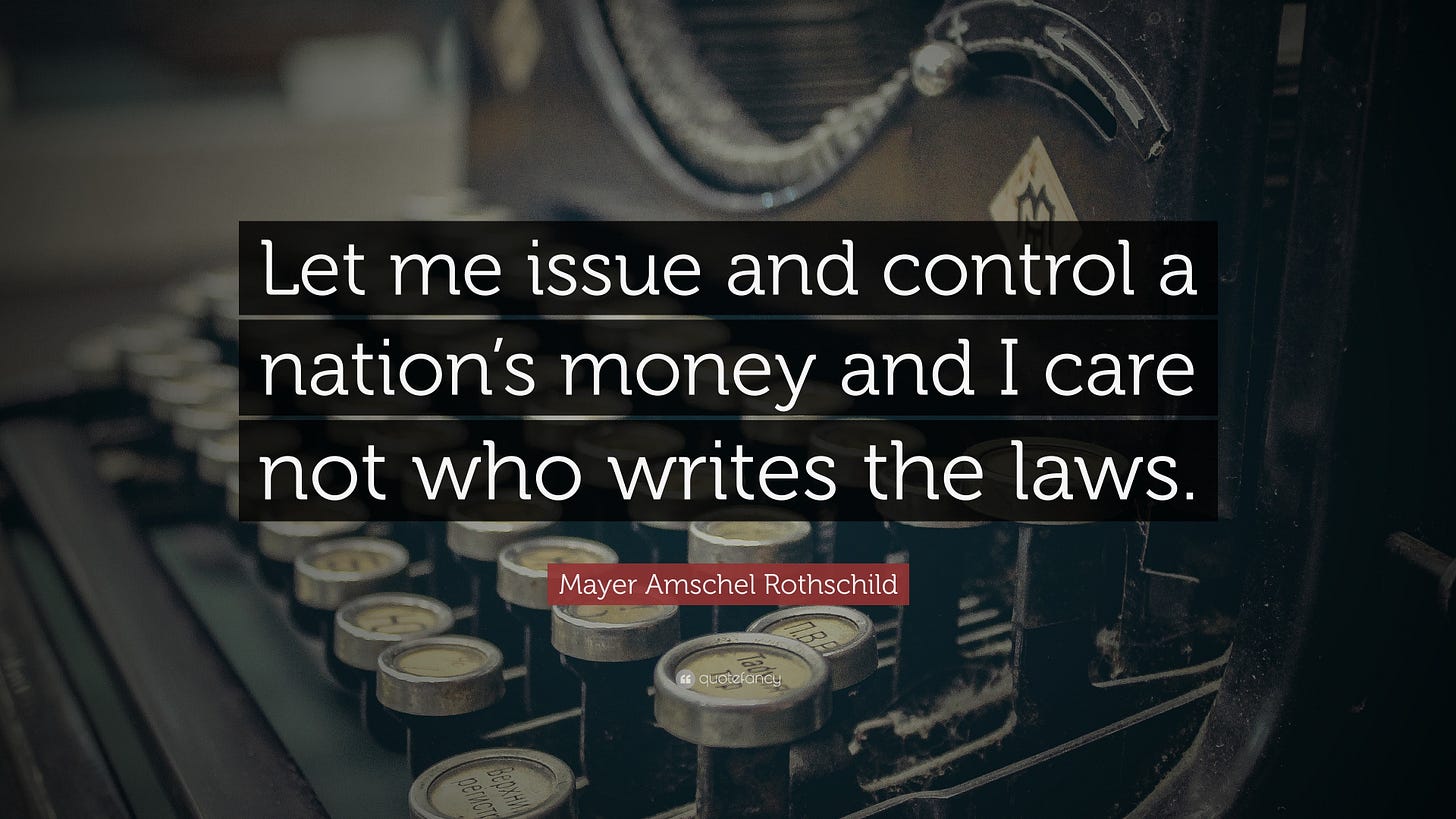
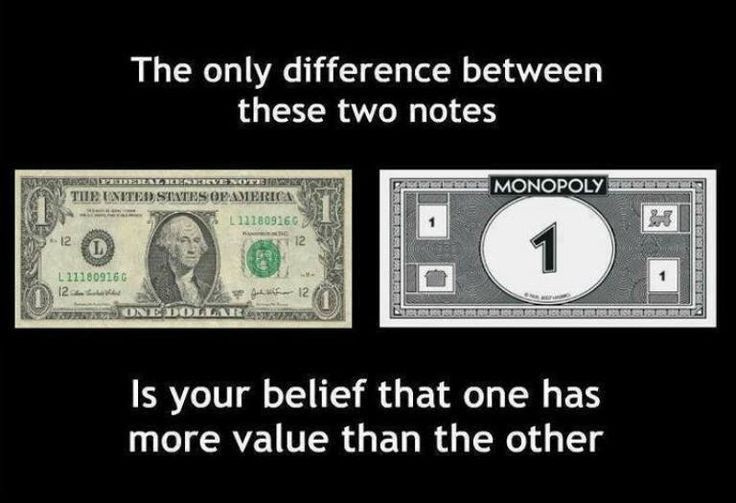
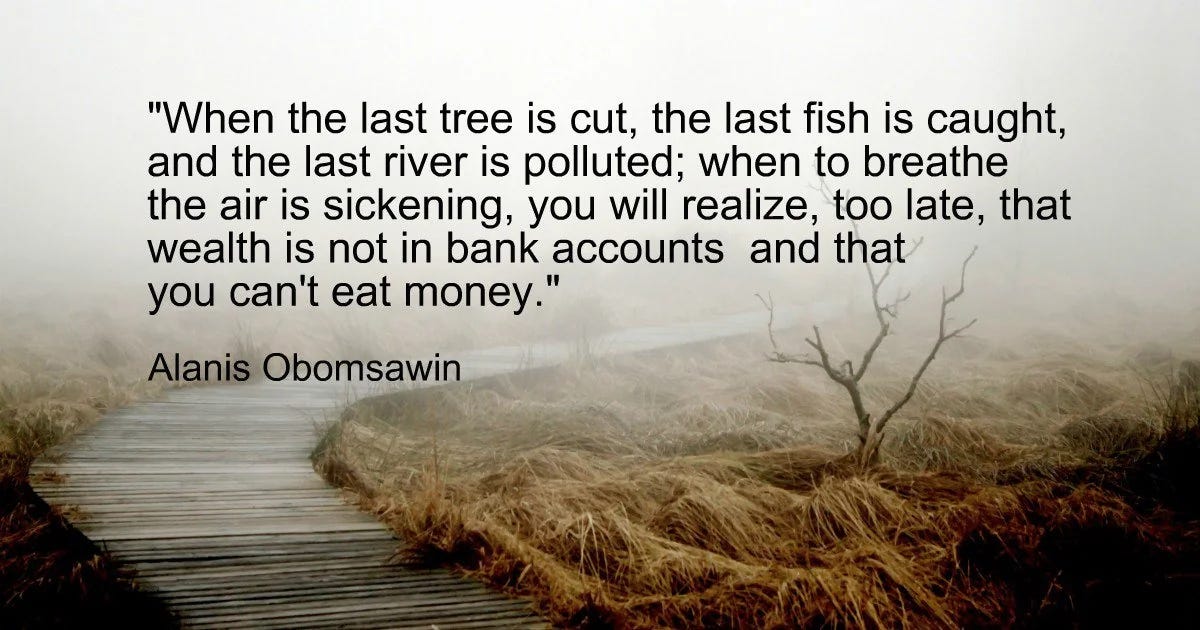
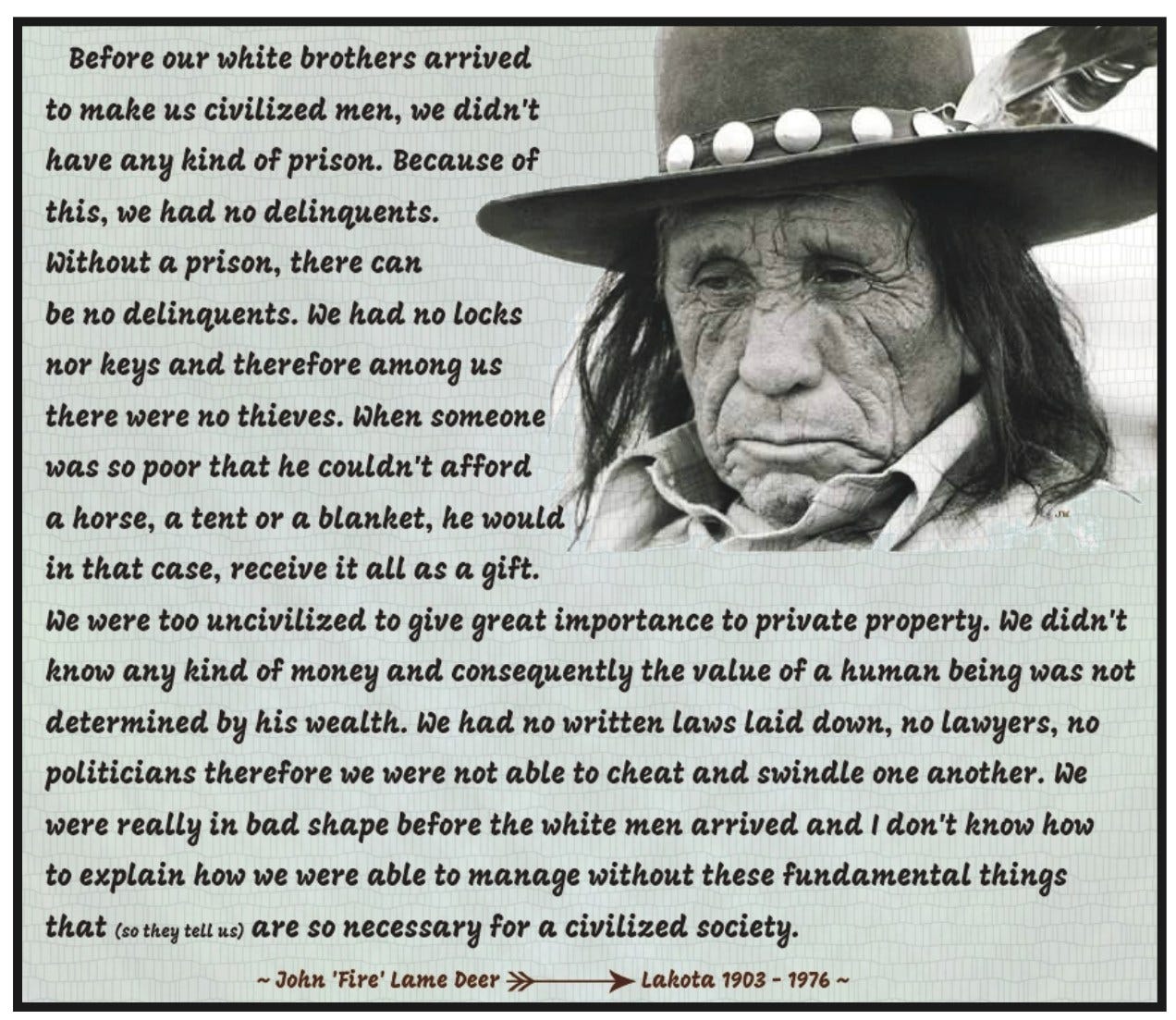


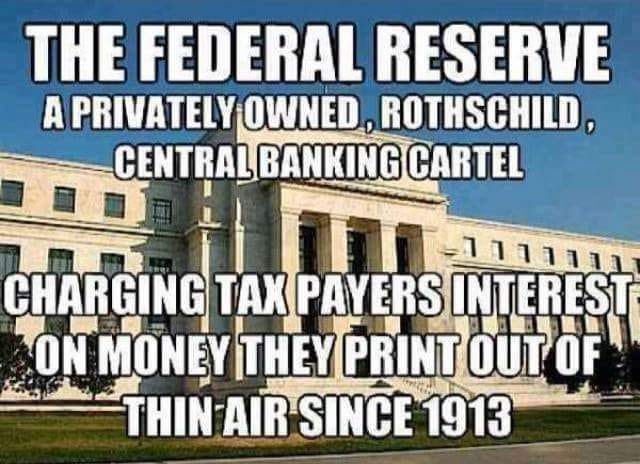
"if you could erase the thing called money from being part of the human story, would you?"
"If you could prevent fiat currency from ever being invented/institutionalized, would you?"
These are not the same question, because 'fiat currency' is not 'money.'
The "Federal Reserve" is neither 'federal' nor 'a reserve.'
Mike Maloney does a great job explaining a very complicated issue here: https://youtube.com/playlist?list=PLE88E9ICdiphYjJkeeLL2O09eJoC8r7Dc&si=uoCTclnITqfVfbV0
Also, thanks for making me look up Kondiaronk.
All currency needs to be permenatly fixed to one value. No upside or downs. It a tool of trade.. but others created hell through manipulation of markets, charging interest and fees on everything. It needs to be simple, stable
No third party getting slices of every dollar and coin and no charging interest. Our problem is all this slicing through value. Buy gold, there is a fee, sell gold another fee. Soros made billions off of value manipulation... off of air... and then lowers the value for others... The Fed is a parasite.